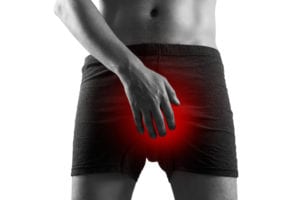Explaining Prostatitis

What causes prostatitis?
Prostatitis may be caused by bacteria, inflammation or physical trauma of some sort. Bacterial prostatitis may develop if pathogens accumulate in the urinary tract and urine leaks into the prostate. This form of prostatitis may coincide with a sexually transmitted infection and could adversely affect male fertility if not treated promptly. Studies suggest that only about 5% of cases are caused by bacteria. The majority of prostatitis cases originate from an inflammation, injury, prior infection, or muscle spasms in the pelvic floor.
Nonbacterial prostatitis may be linked to certain physical activities and jobs as well as stress and constipation. Examples include repeatedly using heavy machinery or tools that vibrate, such as a jackhammer. Performing heavy lifting with a full bladder can also put strain on the pelvic floor that results in injury to the prostate. Not all men who perform such activities develop prostatitis. However, there is an increased risk.
Treating Prostatitis
A urologist develops prostatitis treatment depending on the cause. Options may include one or more of the following:
- Men diagnosed with bacterial prostatitis may be prescribed an antibiotic. Men with nonbacterial prostatitis may be prescribed an alpha-blocker to promote blood flow, a muscle relaxant if spasms are involved, or a pain reliever like ibuprofen or naproxen to reduce inflammation. If you are taking multiple courses of antibiotics without relief it is unlikely that your have bacterial prostatitis or not treating the bacteria correctly.
- Pelvic Floor Physical therapy. Some men gain temporary relief from muscle spasms and other pain related to prostatitis using physical therapy that targets the pelvic floor or taking warm baths that relax the lower abdominal muscles and pelvic floor muscles.
- Lifestyle modifications including reducing alcohol consumption, avoiding inflammatory foods, red meat and avoiding smoking.
Urological problems like prostatitis can be concerning and frustrating if they persist or recur. We can help you understand the cause of urologic symptoms and navigate appropriate treatment options. To schedule a consultation in our Chattanooga office, call (423) 778-4MEN (4636).


